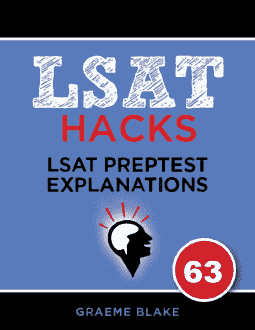QUESTION TEXT: People who browse the web for medical information…
QUESTION TYPE: Necessary Assumption
CONCLUSION: People who rely on the web to diagnose their medical conditions are likely to do themselves more harm than good.
REASONING: People who look for medical info on the web often can’t tell what is scientific and what is quackery (nonsense). A lot of the quackery is attractive because it is more clearly written than scientific papers.
ANALYSIS: The argument is assuming that people will often hurt themselves if they rely on quackery. But this doesn’t have to be the case. Maybe quackery is harmless or occasionally beneficial.
___________
- This isn’t necessary. It’s only necessary that when they do try to diagnose themselves, they hurt themselves more often than not.
Negation: Most of the time, people browsing the web for medical information aren’t trying to diagnose themselves. - CORRECT. If people are not more likely to do themselves more harm than good even if they look at quackery then this argument isn’t much good.
- This isn’t necessary. The argument would actually be slightly strengthened if some of these people hurt themselves too.
- This would be helpful to the argument, because it would mean that people might assume that quackery is scientific. But it doesn’t need to be true.
Negation: Few people who browse the web assume information is not scientifically valid unless it is clearly written. - This isn’t necessary. The argument is fine if some people manage to harm themselves despite looking only at scientific literature.
Negation: People attempting to diagnose themselves may hurt themselves even if they only use scientific literature.


Why is B correct?? The answer choice says “UNLESS they rely EXCLUSIVEY on scientifically valid information,” but why is that necessary? It could still fit with the stimulus to say that one who relies MOSTLY on scientifically valid information and just A LITTLE on quackery would still be LIKELY to be doing more harm than good.
Someone please explain this.
Because the argument is saying any amount of quackery will make people cause themselves more harm than good. As you say, I think. Unless they rely 100% on scientific info means if they use less than 100% scientific info, they’ll hurt themselves. So if they use even a little bit of quackery, they’ll hurt themselves.
Negate B and you can: “You can use a bit of quackery and still help yourself by doing internet research”.
Note: This is an old comment but I wanted to clarify the point.
I’m having a lot of trouble understanding this question. Can you explain further?
Let’s examine the reasoning of the argument: the stimulus is saying that people with no medical background are likely to do themselves more harm than good when relying on self-diagnosis via the internet because internet quackery is written more clearly (and therefore appealingly) than scientifically valid papers.
What’s the issue here? Well, maybe people can benefit from self-diagnosis through internet quackery, i.e. self-diagnosis does not necessarily do more harm than good. Maybe internet quackery does equal parts harm and good. Think of the placebo effect, or consider the possibility that reading internet articles about some actually non-existent ailment gives people a needed push to see their family doctors for a general check-up that they wouldn’t otherwise do. To make this argument fall apart, all we’d need to do is show that web self-diagnosis is likely to do either the same amount of harm as good, or more good than harm.
So, (B) shows a necessary assumption of this argument. We need a premise that shows that reading quackery instead of scientifically valid papers does active harm.
Why doesn’t D) need to be true? Is the word “many” causing the problem?
(D) could strengthen the argument, because that would mean that (potentially) people might not use scientifically valid papers if they are not clearly written. However, this answer choice is not necessary for the argument. Even without this premise, we know from the stimulus that people are using quackery to self-diagnose. So, whether or not they assume that information is not scientifically valid unless it is clearly written isn’t essential to the argument.
Also, note the negation of the answer choice (as it is written in the explanation): “Few people who browse the web assume information is not scientifically valid unless it is clearly written.” If we plug that into the argument in the stimulus, the argument does not fall apart, because people could still be using web quackery even if they don’t think that information is not scientifically valid unless it is clearly written.